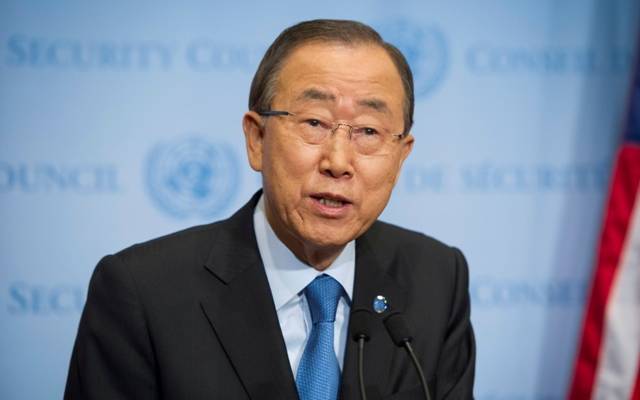Instead of condemning Hamas, which controls Gaza, for building terror tunnels, and ensuring that the Palestinians “end their incitement, the secretary-general chooses to condemn Israel on a regular basis,” Israel’s Ambassador to the UN, Danny Danon, said in a statement.
United Nations (UN) Secretary-General Ban Ki-moon on Thursday called Prime Minister Benjamin Netanyahu’s statement that the Palestinians seek an “ethnic cleansing” of Jews in Judea and Samaria as “unacceptable and outrageous.”
Ban told the UN Security Council (UNSC) that he wanted to be absolutely clear: “Settlements are illegal under international law.”
In some of the strongest language he’s used on the Israeli-Palestinian issue, Ban said Israel’s “stifling and oppressive occupation” of Palestinian territory “must end.”
Israel’s policy that has more than 500,000 Israelis living in Judea and Samaria and parts of Jerusalem “is diametrically opposed to the creation of a Palestinian state,” he said. And the international community, including the Security Council, “views the expansion of settlements as an obstacle to peace.”
US Ambassador Samantha Power was also critical, saying the United States, which is Israel’s closest ally, “strongly opposes continued Israeli settlement activity, which is corrosive to the cause of peace” and Israel’s desire for a two-state solution.
Israel’s UN Ambassador Danny Danon criticized Ban’s “distorted view of the situation,” saying “the obstacle to peace starts and ends with Palestinian incitement to terrorism” and Palestinian leader Mahmoud Abbas’s refusal to meet with Netanyahu.
Instead of condemning Hamas, which controls Gaza, for building terror tunnels, and ensuring that the Palestinians “end their incitement, the secretary-general chooses to condemn Israel on a regular basis,” Danon said in a statement.
Ban was also critical of the Palestinians, saying he continues “to be appalled that Palestinian parties choose to praise despicable acts, such as the 1972 terrorist attack against Israeli athletes at the Munich Olympics.”
“The glorification of terror is disgraceful and the Palestinian leadership must put an end to it,” the secretary-general said.
He expressed particular concern at the Palestinian High Court’s decision last week to suspend all preparations for local elections, which would be the first in over 10 years.
“Local elections in the West Bank and Gaza, if held in line with international standards, could provide an important renewal of Palestinian democracy and a first step towards advancing national unity,” Ban said.
As for Gaza, he said that while there has been progress in the two years since the 2014 cease-fire with Israel, “Gaza remains under closures and is a ticking time bomb.”
“Instability and the risk of violent escalation are ever-present,” he said. “The continued arms build-up and militant activities by Hamas and other radical groups keep both sides of the border in a constant state of alert.”
Ban said more than 1.3 million of Gaza’s 1.9 million people need humanitarian assistance, and their continued deprivations “smother dreams and ambitions, and feed instability and extremism.”
The secretary-general paid tribute again to Israel’s former president Shimon Peres expressing hope for his speedy recovery from a stroke and praising his tireless work “in seeking peace between Israelis and Palestinians.”
Power said the US shares Ban’s views on rising Israeli-Palestinian tensions and urges all parties to “exercise restraint, refrain from provocative actions and rhetoric.”
Israel returned to Judea and Samaria and united its capital Jerusalem during the 1967 Six Day War. The Palestinians want the territory for their future state, along with the Gaza Strip and east Jerusalem as their capital, and deny the Jews’ ancestral and biblical connection to these lands.
Jews have been living in those areas for centuries, and their presence does not undermine prospects for peace. Israel blames failed peace efforts on Arab denials of the Jewish historical connections to the land.
Some 120 communities have been built in Judea and Samaria, now home to about 400,000 Israeli Jews. Some 200,000 Israeli Jews live in the eastern side of Jerusalem, which Israel annexed and considers part of its eternal, undivided capital.
The Palestinians, along with part of the international community, view Israel’s presence in Judea and Samaria as illegal or illegitimate. They claim the growing number of Israelis makes it increasingly difficult to establish their own state in these territories.
By: AP and United with Israel Staff
Do You Love Israel? Make a Donation to Show Your Support!
Donate to vital charities that protect Israelis and help inspire millions around the world to support Israel too!
Now more than ever, Israel needs your help to fight and win the war -- and also the battle of public opinion.
Anti-Israel bias and boycotts are out of control. Israel's enemies effectively use social media to incite brutal terror against innocent Israeli civilians. Please help us fight back!




